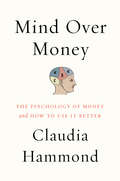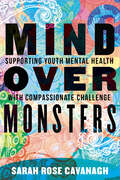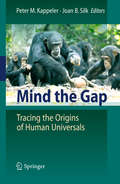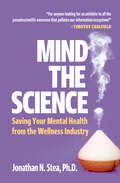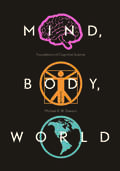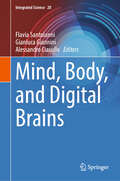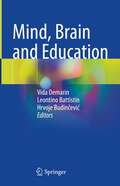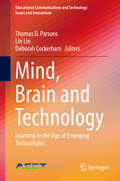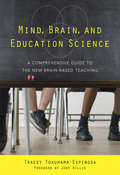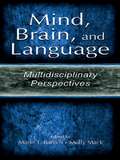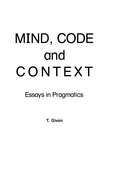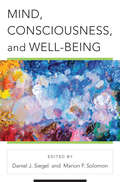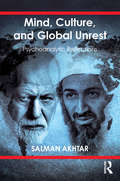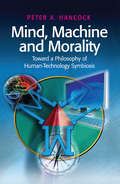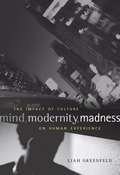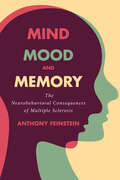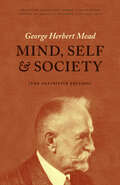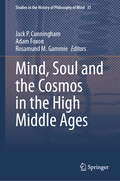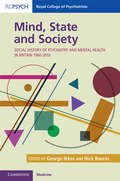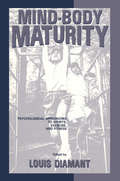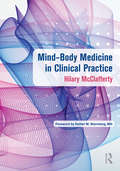- Table View
- List View
Mind over Money: The Psychology of Money and How to Use It Better
by Claudia HammondThe acclaimed author of Time Warped tackles the very latest research in the fields of neuroscience, psychology, and biology to provide a fresh, fascinating, and thought-provoking look at our relationship with money--perfect for fans of Dan Ariely and Freakonomics.We know we need money and we often want more of it, but we don't always think about the way it affects our minds and our emotions, skews our perceptions and even changes the way we behave. Award-winning BBC Radio 4 host Claudia Hammond delves into the surprising psychology of money to show us that our relationship with the stuff is more complex than we might think. Drawing on the latest research in psychology, neuroscience and behavioural economics, she draws an anatomy of the power it holds over us. She also reveals some simple and effective tricks that will help you use and save money better--from how being grumpy can stop you getting ripped off to why you should opt for the more expensive pain relief and why you should never offer to pay your friends for favours. An eye-opening and entertaining investigation into the power money holds over us, Mind over Money will change the way you view the cash in your wallet and the figures in your bank account forever. Mind over Money is an invaluable resource for anyone fascinated by the dynamics of money and for those wishing to learn how to maximize its power and greatest benefit.
Mind over Monsters: Supporting Youth Mental Health with Compassionate Challenge
by Sarah Rose CavanaghAn investigation into the mental health crisis affecting young adults today, and an impassioned argument for creating learning environments characterized both by compassion and challenge.Alarming statistics in recent years indicate that mental health problems like depression and anxiety have been skyrocketing among youth. To identify solutions, psychologist and professor Sarah Rose Cavanagh interviews a roster of experts across the country who are dedicating their lives to working with young people to help them actualize their goals, and highlights voices of college students from a range of diverse backgrounds.Cavanagh also brings the reader on an invigorating tour of pedagogical, neuroscientific, and psychological research on mental health—one that involves her own personal journey from panic to equilibrium.The result of these combined sources of inquiry indicates that to support youth mental health, we must create what Cavanagh calls compassionate challenge— first, we need to cultivate learning and living environments characterized by compassion, and then, we need to guide our youth into practices that encourage challenge, helping them face their fears in an encouraging, safe, and even playful way.Mind over Monsters is a must-read for teachers, administrators, parents, and young people themselves.
Mind the Gap
by Joan Silk Peter KappelerWhat makes us human? What made us become the way we are? One way to answer these questions is to identify the traits that all humans share, traits that are universal features of all human societies. Another way to do so is to ask how humans differ from other species, particularly from our closest relatives, the nonhuman primates. The contributors to this book pursue both approaches, in an effort to understand how evolution has shaped modern human behavior and societies.
Mind the Science: Saving your Mental Health from the Wellness Industry
by Jonathan N. SteaA clinical psychologist who regularly deals with some of society's most vulnerable exposes and debunks the predatory pseudoscience and grift of the multi-trillion-dollar wellness industry and points us towards a better way to take care of our mental health.Can the unbroken gaze of a lone man on a stage in front of hundreds of people truly alleviate their mental distress? Can Berlin Wall pills or a coffee enema cure depression? Can we improve our mental health with past-life regression therapy, cold-water shock therapy, rebirthing therapy? Wellness grifters and alternative-health snake oil salesmen are everywhere these days, and when our medical systems are under stress (and we are, too!) these costly purveyors of false hope are worse than a waste of money—they can lead us to delay badly needed care from real professionals, exacerbate our conditions and, in the most tragic of cases, even kill us. Today, people looking to care for their mental health face a market with at least 600 &“brands&” of psychotherapy—and counting. Most are ineffective, and many could be harmful. There exist countless unregulated providers of mental health services in the $5.6 trillion USD wellness industry and alternative medicine community looking to exploit people&’s financial and emotional vulnerabilities. The world of mental health care is very much caveat emptor: buyer beware. Having seen so many of his patients hurt by the pseudoscience circulating in the industry, Dr. Jonathan N. Stea is on a mission to expose its harm and protect the public from mental health misinformation. In a landscape of rampant burnout and at a time when mental health concerns are at a fever pitch, Mind the Science provides hope and real information to those who have been touched by mental illness, have been misled by false marketing, or are simply curious about the relationship between science and mental health.
Mind, Body, World: Foundations of Cognitive Science
by Michael R. DawsonCognitive science arose in the 1950s when it became apparent that a number of disciplines, including psychology, computer science, linguistics, and philosophy, were fragmenting. Perhaps owing to the field’s immediate origins in cybernetics, as well as to the foundational assumption that cognition is information processing, cognitive science initially seemed more unified than psychology. However, as a result of differing interpretations of the foundational assumption and dramatically divergent views of the meaning of the term information processing, three separate schools emerged: classical cognitive science, connectionist cognitive science, and embodied cognitive science. Examples, cases, and research findings taken from the wide range of phenomena studied by cognitive scientists effectively explain and explore the relationship among the three perspectives. Intended to introduce both graduate and senior undergraduate students to the foundations of cognitive science, Mind, Body, World addresses a number of questions currently being asked by those practicing in the field: What are the core assumptions of the three different schools? What are the relationships between these different sets of core assumptions? Is there only one cognitive science, or are there many different cognitive sciences? Giving the schools equal treatment and displaying a broad and deep understanding of the field, Dawson highlights the fundamental tensions and lines of fragmentation that exist among the schools and provides a refreshing and unifying framework for students of cognitive science.
Mind, Body, and Digital Brains (Integrated Science #20)
by Flavia Santoianni Alessandro Ciasullo Gianluca GianniniThis book—Mind, Body, and Digital Brains—focuses on both theoretical and empirical issues and joins contributions from different disciplines, concepts, and sensibilities, bringing together scholars from fields that at first glance may appear different—Neuroscience and Cognitive Neuroscience; Robotics, Computer Science, Deep Learning, and Information Processing Systems; Education, Philosophy, Law, and Psychology. All these research fields are held together by the very object to be discussed: a broad, articulate, and polyphonic reflection on the status of theories and fields of application of Digital Technologies and Artificial Intelligence, seen from the perspective of the digital mind, digital body, and digital brain. Scientific and humanistic issues will be considered through an interdisciplinary point of view, with the purpose of deepening emerging trends about various disciplines. This book offers a framework for different perspectives and, at the same time, a platform for discussion aimed not only at experts, but also at a non-specialist public interested in the digital revolution. The digital revolution is emerging from the intertwining of ethical, philosophical, and technological aspects, which concern several general issues as cooperation, law, and environment, but also specialized as cybersecurity or algorithmic citizenship. More questions arise, concerning which opportunities and risks are associated with the new scenarios, what idea of humanity is emerging from the increasingly widespread use of Artificial Intelligence technologies, and what idea of integrated science should we promote to accompany the ongoing transformations.
Mind, Brain and Education
by Leontino Battistin Vida Demarin Hrvoje BudinčevićThis book, Mind, Brain and Education, comprises selected topics from Neurology and Psychiatry, showing both their common ground and their differences. A special emphasis is given to the role of scientific gathering with the Mind & Brain Congress as a platform for educating younger colleagues and widening their perspectives in the field of both disciplines. With the new discipline of Psychoneuroendocrinoimmunology (PNEI) and its translation to clinical practice, our long-standing comprehensive approach to the interrelation and bridging of the mind and the brain contributes to a better understanding of this challenging topic. The reader can find new facts showing how diseases are the result of an alteration at the bio-psycho-social level. PNEI provides knowledge about the biological dynamics of conventional medicine and of the importance of lifestyle changes in order to fight disease. Written by experts in the field, the exceptional new approach provided by this book, makes it an innovative tool for spreading new knowledge, and implementing it in everyday clinical practice for the benefit of patients and even more so, to prevent them becoming patients in the first place.
Mind, Brain and Narrative
by Anthony J. Sanford Catherine EmmottNarratives enable readers to vividly experience fictional and non-fictional contexts. Writers use a variety of language features to control these experiences: they direct readers in how to construct contexts, how to draw inferences and how to identify the key parts of a story. Writers can skilfully convey physical sensations, prompt emotional states, effect moral responses and even alter the readers' attitudes. Mind, Brain and Narrative examines the psychological and neuroscientific evidence for the mechanisms which underlie narrative comprehension. The authors explore the scientific developments which demonstrate the importance of attention, counterfactuals, depth of processing, perspective and embodiment in these processes. In so doing, this timely, interdisciplinary work provides an integrated account of the research which links psychological mechanisms of language comprehension to humanities work on narrative and style.
Mind, Brain and Technology: Learning in the Age of Emerging Technologies (Educational Communications and Technology: Issues and Innovations)
by Thomas D. Parsons Lin Lin Deborah CockerhamAs technology becomes increasingly integrated into our society, cultural expectations and needs are changing. Social understanding, family roles, organizational skills, and daily activities are all adapting to the demands of ever-present technology, causing changes in human brain, emotions, and behaviors. An understanding of the impact of technology upon our lives is essential if we are to adequately educate children for the future and plan for meaningful learning environments for them. Mind, Brain and Technology provides an overview of these changes from a wide variety of perspectives. Designed as a textbook for students in the fields and interdisciplinary areas of psychology, neuroscience, technology, computer science, and education, the book offers insights for researchers, professionals, educators, and anyone interested in learning more about the integration of mind, brain and technology in their lives. The book skilfully guides readers to explore alternatives, generate new ideas, and develop constructive plans both for their own lives and for future educational needs.
Mind, Brain, and Education Science: A Comprehensive Guide to the New Brain-Based Teaching
by Tracey Tokuhama-EspinosaEstablishing the parameters and goals of the new field of mind, brain, and education science. A groundbreaking work, Mind, Brain, and Education Science explains the new transdisciplinary academic field that has grown out of the intersection of neuroscience, education, and psychology. The trend in "brain-based teaching" has been growing for the past twenty years and has exploded in the past five to become the most authoritative pedagogy for best learning results. Aimed at teachers, teacher trainers and policy makers, and anyone interested in the future of education in America and beyond, Mind, Brain, and Education Science responds to the clamor for help in identifying what information could and should apply in classrooms with confidence, and what information is simply commercial hype. Combining an exhaustive review of the literature, as well as interviews with over twenty thought leaders in the field from six different countries, this book describes the birth and future of this new and groundbreaking discipline. Mind, Brain, and Education Science looks at the foundations, standards, and history of the field, outlining the ways that new information should be judged. Well-established information is elegantly separated from "neuromyths" to help teachers split the wheat from the chaff in classroom planning, instruction and teaching methodology.
Mind, Brain, and Language: Multidisciplinary Perspectives
by Marie T. Banich Molly MackMuch of the groundbreaking work in many fields is now occurring at the intersection of traditional academic disciplines. This development is well demonstrated in this important and unique volume, which offers a multidisciplinary view of current findings and cutting-edge issues involving the relationship between mind, brain, and language. Marie T. Banich and Molly Mack have edited a collection of 11 invited chapters from top researchers (and have contributed two of their own chapters) to create a volume organized around five major topics--language emergence, influence, and development; models of language and language processing; the neurological bases of language; language disruption and loss; and dual-language systems. Topics range from the evolution of language and child-language acquisition to brain imaging and the "bilingual brain." To maintain continuity throughout, care has been taken to ensure that the chapters have been written in a style accessible to scholars across many disciplines, from anthropology and psycholinguistics to cognitive science and neurobiology. Because of its depth and breadth, this book is appropriate both as a textbook in a variety of undergraduate and graduate-level courses and as a valuable resource for researchers and scholars interested in further understanding the background of and current developments in our understanding of the mind/brain/language relationship.
Mind, Character and Personality (Christian Home Library #Volume 1)
by Ellen G. WhiteIn Ellen G. White's lifetime (1827-1915) psychology, the science that treats of the mind and its powers and functions, was in its infancy. Yet there emerges throughout her writings a distinctive philosophy in which guidelines in this science and to mental health are clearly portrayed. The purpose of this compilation is to bring together for convenient study the Ellen G. White statements in this broad, important, and sometimes controversial field. Seventh-day Adventists, and others with their conviction that the author wrote under the influence of the Spirit of God, treasure guidance in a field so vital to all humanity at a time when schools of psychological thought are varied and changing. The soundness of author's views in the areas of physiology, nutrition, and education, as well as in other fields, has been well demonstrated.
Mind, Character and Personality (Christian Home Library #Volume 2)
by Ellen G. WhiteA large portion of this book presents general guiding principles. This is interspersed and supplemented with materials setting forth practical admonitions and counsels in the setting of the relationship of the teacher and the student, the minister and the parishioner, the physician and the patient, or the parent and the child. The counsels in scores of instances addressed to an executive, minister, physician, teacher, editor, husband, homemaker, or youth may, in their revelation or circumstances and advice given, partake somewhat of the form of case histories. Attention should be directed to the principles involved. The book is somewhat encyclopedic. Each quotation carries a specific credit to its source in the Ellen G. White materials, making it possible for the reader in many cases to turn to the full original context.
Mind, Code and Context: Essays in Pragmatics (Neuropsychology and Neurolinguistics Series)
by T. GivonScholars concerned with the phenomenon of mind have searched through history for a principled yet non-reductionist approach to the study of knowledge, communication, and behavior. Pragmatics has been a recurrent theme in Western epistemology, tracing itself back from pre-Socratic dialectics and Aristotle's bio- functionalism, all the way to Wittgenstein's content-dependent semantics. This book's treatment of pragmatics as an analytic method focuses on the central role of context in determining the perception, organization, and communication of experience. As a bioadaptive strategy, pragmatics straddles the middle ground between absolute categories and the non-discrete gradation of experience, reflecting closely the organism's own evolutionary compromises. In parallel, pragmatic reasoning can be shown to play a pivotal role in the process of empirical science, through the selection of relevant facts, the abduction of likely hypotheses, and the construction of non-trivial explanations. In this volume, Professor Givon offers pragmatics as both an analytic method and a strategic intellectual framework. He points out its relevance to our understanding of traditional problems in philosophy, anthropology, linguistics, cognitive psychology, neuro-biology, and evolution. Finally, the application of pragmatics to the study of the mind and behavior constitutes an implicit challenge to the current tenets of artificial intelligence.
Mind, Consciousness, and Well-Being (Norton Series on Interpersonal Neurobiology #0)
by Daniel J. Siegel Marion F. SolomonScientists, clinicians, and mindfulness teachers discuss training the mind to bring more health and resiliency to our lives. In this book, Daniel J. Siegel and Marion F. Solomon have gathered leading writers to discuss such topics as: attention, resilience, and mindfulness; neuroplasticity—how the brain changes its function and structure in response to experience; “loving awareness” as the foundation for mindful living; how mindfulness training can help build empathy and compassion in clinicians; self-compassion; addictions; using breath practice to cultivate well-being; tools for clients who feel disconnected; “therapeutic presence”—how we show up for our clients, how we embody being aware and receptive. The latest entry in the acclaimed Norton Series on Interpersonal Neurobiology, this book brings fresh voices to the all-important topics of meditation, mental training, and consciousness. Mind, Consciousness, and Well-Being offers a unique window into the science and art of taking our understanding of the mind and consciousness and applying it to cultivating well-being in our personal lives and our professional work. Contributors include Pat Ogden, Shauna Shapiro, Bonnie Goldstein, Trudy Goodman Kornfield, Jack Kornfield, Kristin Neff, Judson Brewer, Gary Small, Amishi Jha, and more.
Mind, Culture, and Global Unrest: Psychoanalytic Reflections
by Salman AkhtarIn this compact and pithy book, the distinguished and prolific psychoanalyst Salman Akhtar steps out of his consulting room to address certain matters of urgent global concern. These include migration across national borders, the current refugee crisis, ethno-racial prejudice, subjective distress of minorities, and, above all, the forever-present ominous shadow of terrorism. Akhtar evolves and advocates a uniquely 'anthropological psychoanalysis' which is a blend of depth psychology and humanities, including sociology, economics, political science, history, and , of course, anthropology. He deconstructs what seems self-evident and confronts his readers with some socio-politically unpleasant realities, both within psychoanalysis and in the prevalent perspectives on the on-going turmoil and bloodshed in today's world. His book is not all doom and gloom, however. It also delineates ameliorative strategies for dealing with the pain of the disenfranchised and the misguided violence of the radicalized. This is applied psychoanalysis at its best.
Mind, Machine and Morality: Toward a Philosophy of Human-Technology Symbiosis
by Peter A. HancockTechnology is our conduit of power. In our modern world, technology is the gatekeeper deciding who shall have and who shall have not. Either technology works for you or you work for technology. It shapes the human race just as much as we shape it. But where is this symbiosis going? Who provides the directions, the intentions, the goals of this human-machine partnership? Such decisions do not derive from the creators of technology who are enmeshed in their individual innovations. They neither come from our social leaders who possess only sufficient technical understanding to react to innovations, not to anticipate or direct their progress. Neither is there evidence of some omnipotent 'invisible hand,' the simple fact is that no one is directing this enterprise. In Mind, Machine and Morality, Peter Hancock asks questions about this insensate progress and has the temerity to suggest some cognate answers. He argues for the unbreakable symbiosis of purpose and process, and examines the dangerous possibilities that emerge when science and purpose meet. Historically, this work is a modern-day child of Bacon's hope for the 'Great Instauration.' However, unlike its forebear, the focus here is on human-machine systems. The emphasis centers on the conception that the active, extensive face of modern philosophy is technology. Whatever we are to become is bound up not only in our biology but critically in our technology also. And to achieve rational progress we need to articulate manifest purpose. This book is one step along the purposive road. Drawing together his many seminal writings on human-machine interaction and adapting these works specifically for this collection, Peter Hancock provides real food for thought, delighting readers with his unique philosophical perspective and outstanding insights. This is theoretical work of the highest order and will open minds accordingly.
Mind, Make-Believe and Medicine: Exploring the Divide Between Science and Wishful Thinking
by Richard RaskerThis book delves into the world of alternative medicine and related phenomena in several different ways, both from a scientific perspective and the perspective of supporters and practitioners of those phenomena.An attempt is made to explain not only what those perspectives are, but also why they are often so radically different. Why do lots of people believe things that other people don't? To find answers, we don't just examine the things people believe in or not, but also human traits in thinking, reasoning and belief.
Mind, Modernity, Madness: The Impact of Culture on Human Experience
by Liah GreenfeldIt’s the American dream-unfettered freedom to follow our ambitions, to forge our identities, to become self-made. But what if our culture of limitless self-fulfillment is actually making millions desperately ill? One of our leading interpreters of modernity and nationalism, Liah Greenfeld argues that we have overlooked the connection between egalitarian society and mental illness. Intellectually fearless, encompassing philosophy, psychology, and history, Mind, Modernity, Madness challenges the most cherished assumptions about the blessings of living in a land of the free. Modern nationalism, says Greenfeld, rests on bedrock principles of popular sovereignty, equality, and secularism. Citizens of the twenty-first century enjoy unprecedented freedom to become the authors of their personal destinies. Empowering as this is, it also places them under enormous psychic strain. They must constantly appraise their identities, manage their desires, and calibrate their place within society. For vulnerable individuals, this pressure is too much. Training her analytic eye on extensive case histories in manic depression and schizophrenia, Greenfeld contends that these illnesses are dysfunctions of selfhood caused by society’s overburdening demands for self-realization. In her rigorous diagnosis, madness is a culturally constituted malady. The culminating volume of Greenfeld’s nationalism trilogy, Mind, Modernity, Madness is a tour de force in the classic tradition of Émile Durkheim-and a bold foray into uncharted territory. Often counter-intuitive, always illuminating, Mind, Modernity, Madness presents a many-sided view of humanity, one that enriches our deepest understanding of who we are and what we aspire to be.
Mind, Mood, and Memory: The Neurobehavioral Consequences of Multiple Sclerosis
by Anthony FeinsteinA unique resource for all health care practitioners caring for people with multiple sclerosis.Endorsed by The Consortium of Multiple Sclerosis CentersMultiple sclerosis (MS), a progressive neurologic disease, is characterized by a host of physical symptoms. But the neurobehavioral consequences of MS can be as devastating and debilitating as physical symptoms, and they are often unreported and undertreated. In this new book, Dr. Anthony Feinstein, a neuropsychiatrist, documents the effects of MS on cognition, information processing speed, learning and memory, executive function, personality, mood, and behavior.Feinstein touches on a number of topics, including• the common cognitive challenges that occur with MS, such as slowed information processing speed, impaired memory, and executive function deficits • psychiatric disorders that accompany MS, such as depression and psychosis• current neuropsychological, brain MRI, and treatment data applicable to the psychiatric and cognitive disordersMind, Mood, and Memory in Multiple Sclerosis is enhanced both by the latest science and by eloquent case histories that illustrate each cognitive and emotional disorder. Feinstein also provides recommendations for evidence-based therapeutic interventions. Written in an immediate, accessible way, this book has a crossover appeal, making it of interest not only to neurologists, psychiatrists, neuropsychiatrists, neuropsychologists, psychologists, occupational therapists, and nurses but also to people with MS and their caregivers, family, and friends.
Mind, Self & Society: The Definitive Edition
by Hans Joas George Herbert Mead edited by Charles W. Morris annotated by Daniel R. HuebnerGeorge Herbert Mead is widely recognized as one of the most brilliantly original American pragmatists. Although he had a profound influence on the development of social philosophy, he published no books in his lifetime. This makes the lectures collected in Mind, Self, and Society all the more remarkable, as they offer a rare synthesis of his ideas. This collection gets to the heart of Mead’s meditations on social psychology and social philosophy. Its penetrating, conversational tone transports the reader directly into Mead’s classroom as he teases out the genesis of the self and the nature of the mind. The book captures his wry humor and shrewd reasoning, showing a man comfortable quoting Aristotle alongside Alice in Wonderland. Included in this edition are an insightful foreword from leading Mead scholar Hans Joas, a revealing set of textual notes by Dan Huebner that detail the text’s origins, and a comprehensive bibliography of Mead’s other published writings. While Mead’s lectures inspired hundreds of students, much of his brilliance has been lost to time. This new edition ensures that Mead’s ideas will carry on, inspiring a new generation of thinkers.
Mind, Soul and the Cosmos in the High Middle Ages (Studies in the History of Philosophy of Mind #31)
by Jack P. Cunningham Adam Foxon Rosamund M. GammieThis is a unique volume in which a critical introduction and multiple chapters offer a wide-ranging discussion of medieval conceptions of the nature of humankind, its relationship with the universe, and the processes of thinking by which both are conceptualized. Concentrating on the centuries spanning the High Middle Ages, chapters include in-depth analyses of such ideas as the habit as the ultimate dwelling place of the soul, the Soul of the Universe and its relation to humanity, and the Agent Intellect’s part in the functions of the mind regarding abstraction and intuition. This book explores how metaphysical Intelligences interact with our movements, how the desires of our minds affect the acquisition of knowledge, as well as asking how and why analysis of the makeup of animal souls took place. The High Middle Ages was a crucially important epoch in the history of intellectual endeavor. This volume appeals to students and researchers; it discusses and evaluates the contributions on the subjects of mind, soul, and the cosmos of some of the finest Christian, Jewish, and Moslem intellects in the twelfth and thirteenth centuries. Theologians, philosophers, and cosmologists include Aquinas, Grosseteste, Avicenna, Gersonides, Buridan, the School of Chartres, as well as many others. The overarching theme of this collection of essays is that vitally new conceptions of what it meant to be a rational Human, the purpose of thought in relation to the journey of the soul, and the metaphysical character of our universe contributed enormously to the paradigm-shifting nature of this age.
Mind, State and Society: Social History of Psychiatry and Mental Health in Britain 1960–2010
by Nick Bouras George IkkosMind, State and Society examines the reforms in psychiatry and mental health services in Britain during 1960–2010, when de-institutionalisation and community care coincided with the increasing dominance of ideologies of social liberalism, identity politics and neoliberal economics. Featuring contributions from leading academics, policymakers, mental health clinicians, service users and carers, it offers a rich and integrated picture of mental health, covering experiences from children to older people; employment to homelessness; women to LGBTQ+; refugees to black and minority ethnic groups; and faith communities and the military. It asks important questions such as: what happened to peoples' mental health? What was it like to receive mental health services? And how was it to work in or lead clinical care? Seeking answers to questions within the broader social-political context, this book considers the implications for modern society and future policy. This title is also available as Open Access on Cambridge Core.
Mind-Body Maturity: Psychological Approaches To Sports, Exercise, And Fitness
by Louis DiamantFirst published in 1991. Routledge is an imprint of Taylor & Francis, an informa company.
Mind-Body Medicine in Clinical Practice
by Hilary McClaffertyConsumer demand for integrative medicine has increased over recent decades, and cutting-edge research in neuroscience has identified opportunities for new treatment options. This text outlines the evidence behind mind-body medicine and provides rich case-based examples.. It is written by a clinician, for clinicians, to help practitioners stay current in this emerging field. Including foundational chapters on the relevance of mind-body medicine, the effects of stress, communication skills, and methods for incorporating mind-body medicine into consultation, this book then introduces various mind-body therapies and considers their use in selected clinical conditions. The therapies are grouped into chapters on breath work and relaxation; hypnosis and guided imagery; meditation, mindfulness, spirituality, and compassion-based therapies; creative arts therapies; and movement therapies. Each chapter includes case studies, background and history, best use, training requirements, risks and benefits. The part focusing on specific conditions updates research and provides pediatric and adult examples in the areas of: anxiety and depression; acute and chronic pain; gastrointestinal and urologic conditions; auto-immune, inflammatory; and surgery, oncology, and other conditions. Providing resources and practical tools to help clinicians incorporate evidence-based mind-body medicine therapies into patient care, this book is an invaluable reference for medical and nursing students, as well as for residents, fellows, nurse practitioners and physician assistants across a wide variety of specialties.
